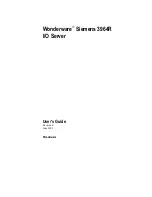Policy-Based Data Replication
System Administration Manual
346
Replication Files to Exclude Syntax
Replication "Files to Exclude" statements, each containing a number of expressions identifying
which directories or files to exclude from the replication can be written using the following
guidelines:
Note:
BlueArc recommends creating the "Files to Exclude" list before the
initial replication copy, and not changing it unless necessary. When running
incremental updates, changes in the Files to Exclude list do not act
retrospectively. For instance suppose the Files to Exclude list initially
excludes "*.mp3". Then no files with the .mp3 extension will be migrated. If
the replication or rule is then changed such that files with the mp3
extension are no longer excluded, then any new or changed mp3 files will be
replicated. However, any mp3 files than haven't changed since the previous
replication copy will not be replicated.
•
The asterisk "
*
" can be used as a wildcard character to qualify path and filename values.
When used in a path value, "
*
" is only treated as a wildcard if it appears at the end of a
value, e.g.
/
path
*
. In a filename value,
a single
"
*
" can appear at the beginning and or
the end of the value. e.g *
song.mp*, *blue.doc, file
*.
•
Parentheses (), spaces, > greater than and quotation marks (") are allowed around a
filename or path list but they will be treated as literal characters
.
•
Path and filename can be defined together but must be separated by a comma (,). e.g. /
subdir/path*,*song.doc,newfile*,/subdir2
•
The forward slash (
/
) is used as a path separator. As such, it must not be used in a
filename list.
Replication Schedules
After a Replication Policy has been defined, it must be scheduled to run. Replications can be
scheduled and rescheduled at any time and with any of the available scheduling option.
Replication Schedules Overview:
•
Periodic replication:
replications will occur at preset times. Periodic replications can be
setup to run daily, weekly, monthly or at intervals specified in number of hours or days.
•
Continuous replication:
a new replication job starts after the previous one has ended.
The new replication job can start immediately or after a specified number of hours.
•
One time replication:
a replication job is set-up to run a specific time.
When planning Replication Schedules, it is recommended to schedule them to run during off-
peak times such as nights or over the weekends. After a replication has started, additional
replications for the same policy cannot be started until the current one has completed. However,
it is possible to start multiple concurrent replication, each for its own policy.
Содержание Titan SiliconServer
Страница 1: ...Titan SiliconServer System Administration Manual ...
Страница 12: ...Table of Contents xii Titan SiliconServer ...
Страница 308: ...File Services 296 Titan SiliconServer 4 Click OK To access available iSCSI Targets 1 Click on the Available Targets tab ...
Страница 411: ...Status Monitoring 399 Titan SiliconServer 3 Click details ...


















